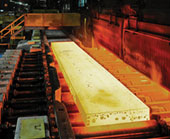Overall objective

Comprehensive step change improvement in high temperature measurement in industry. For optimised energy use, improved product quality, zero waste manufacturing and reduced CO2 emission.
Reliable in-situ/on-site non-contact thermometry solving the following problems: unknown emissivity, reflected radiation, variable path transmission, thermometer drift.
Novel in-situ validation methods for contact thermometers:
- First EU capability for drift and lifetime determination of temperature sensors
- First EU capability to determine low uncertainty reference functions for non-standard thermocouples
View project summary on EMRP site.
The environmental, financial and social impact of this project is likely to be very high

Environmental: Industries requiring high temperatures generally have high CO2 emissions. Improved in-process temperature measurement optimises energy use and minimises emissions.
Financial: Improved in-process temperature measurement will directly lead to improved process control with commensurate waste reductions and increased product quality.
Social: Improving competitiveness helps keep energy intensive industries (large employers) located in EU. Grow EU lead in innovative temperature sensor sector.
EC directives: Indirectly helps implementation through reducing emissions, waste and environmental impact optimising use of natural resources particularly in intensive energy sector.
